Summary of Findings

President George W. Bush’s approval ratings have fallen to another new low, amid a growing focus on alleged ethical lapses in his administration. Just 36% now believe that Bush has lived up to his campaign pledge to restore integrity to the White House.
In contrast, fully 79% of Americans say the recent indictment of I. Lewis Libby, formerly a top aide to Vice President Cheney, on perjury and other charges is a matter of at least some importance to the nation; that is greater than the percentage who said that in 1998 about charges that former President Clinton lied under oath about a sexual relationship with Monica Lewinsky (65%).
A plurality of Americans (42%) think that Libby is guilty of the charges brought against him. Moreover, an increasing number of Americans think that U.S. and British leaders were mostly lying when they claimed prior to the Iraq war that Iraq possessed weapons of mass destruction; 43% express that opinion now, up from 31% in February 2004.
Despite mounting criticisms of the president, Bush’s latest nominee for the Supreme Court Judge Samuel Alito Jr. has received favorable initial reviews from the public. By nearly two-to-one (40%-23%), Americans say the Senate should confirm Alito to the court. This is similar to the public’s response to Judge John Roberts in mid-September, nearly two months after his nomination, and is a greater vote of confidence than failed nominee Harriet Miers received in early October.
Unfortunately for the administration, the positive glimmers from Alito’s nomination are being overshadowed by negative developments elsewhere. When asked to name the first current news story that comes to mind, Americans most frequently cite the war and troop deaths in Iraq (19%), recent hurricanes and their aftermath (14%), and the Libby case (11%); far fewer mention Bush’s appointments to the Supreme Court (5%).
The latest national survey by the Pew Research Center, conducted Nov. 3-6 among 1,201 Americans, finds that the public also continues to view the war in Iraq as the most important problem facing the country. About three-in-ten (29%) volunteer the war as the biggest national problem, up from 24% in May, while 11% mention the economy.
The survey also shows that just a third of Americans approve of the job performance of Republican congressional leaders, while only slightly more (36%) give positive marks to Democratic leaders. Democratic leaders have gained a bit since last month (from 32%), but still a plurality of Americans continue to disapprove of the job performance of each party.
Bush’s Eroding Base

Bush’s current 36% job approval rating is the lowest of his presidency, down from 40% in late October and 50% at the start of the year. This decline reflects a souring of opinion among independents just 29% approve of the president’s job performance today, compared with 47% at the start of the year. Democratic evaluations have been both stable and overwhelmingly negative over the course of the year.
However, Bush is also now facing a significant loss of support within his own party particularly among moderate Republicans. Overall, the proportion of Republicans who approve of Bush’s job in office has dropped from 89% just after the 2004 election to 77% today.
The most significant turn in Republican support occurred in late summer among the party’s moderates and liberals, who make up 37% of the GOP. Between July and the end of September, the percentage of moderate and liberal Republicans who approved of the president’s job performance fell from 81% to 60%. While there has been some rebound since this post-Katrina low, currently 66% of moderate and liberal Republicans approve, while 29% disapprove of the president’s job in office. By comparison, conservative Republicans who make up a solid majority of the party as whole (62%) have been more loyal, though the percentage giving the president favorable marks has fallen 10 points since January to 84% today.

Bush Ratings in Context
One year after their respective reelection victories, Bush’s job approval is nine points higher than former President Richard M. Nixon’s approval mark in early November 1973 (36% vs. 27%). For Nixon, this came amid the continuing Watergate scandal and shortly after the resignation of Vice President Spiro Agnew in October. Nixon’s final approval would drop just three more points to 24% before he resigned from office in the summer of 1974.
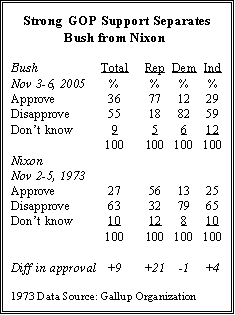
But it is largely GOP loyalty that separates Bush from Nixon at comparable points in their presidencies. Bush’s 29% approval rating among independents is only four points higher than Nixon’s standing among independents in early November 1973. And Bush’s 12% approval rating among Democrats is nearly identical to Nixon’s (13%).
Despite Bush’s lower ratings among Republicans in recent months, his standing among Republicans remains much higher than Nixon’s was in the fall of 1973. By more than four-to-one (77%-18%), Republicans approve of Bush’s job performance; Nixon’s rating among his own party was less than two-to-one positive (56%-32%).
One-Word Reactions to Libby Indictment
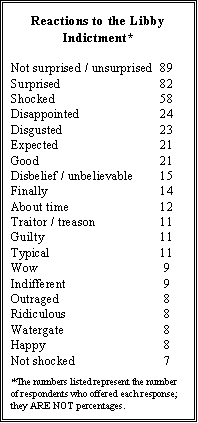
The public reacted to the indictment of Vice President Dick Cheney’s top aide with a mixture of shock and dismay, but many people also said they were not surprised by it. The poll’s respondents who were paying at least some attention to the story were asked what one word best described their reaction to the news of Libby’s indictment. The top two responses were opposites: “not surprised” (mentioned by 89 people) and “surprised” (82 people). The third most common word was “shocked,” which was mentioned by 58 people but 21 said it was “expected” and 7 were “not shocked.”
Many responses reflect positive views of the indictment: “good,” “finally,” “traitor” or “treason,” “about time,” and “guilty” were all mentioned by several people. Those who disagreed with the indictment used fewer words in common: “ridiculous” was mentioned by eight people. Instead, a wide range of words was used to express opposition to the charges: among the words getting fewer than five mentions each were “witch hunt,” “waste of time,” “baloney,”
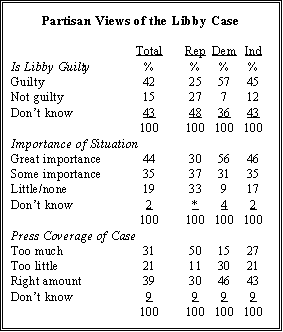
“innocent,” “ludicrous,” “no crime,” “not fair,” “overblown,” “trumped up,” “sham,” and “nitpick.”
Plurality Sees Libby as Guilty
Overall, 42% of those interviewed said they thought Libby is guilty, while just 15% believed that he is innocent. But a relatively large number of people (43%) declined to offer an opinion about the case. However, 61% among those following the case very closely believe Libby committed the crimes he’s charged with.
Partisan affiliation is a also factor in reactions to the Libby case, but opinions are not solely a function of partisanship. A majority of Democrats (57%) think Libby is guilty, while Republicans are evenly divided with about as many saying he is guilty (25%) as not guilty (27%).
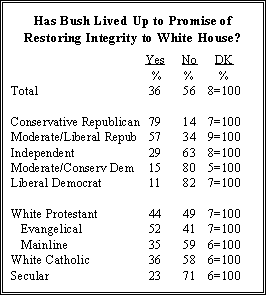
Most Americans do not believe that there has been too much news coverage of the matter. Six-in-ten think the story has gotten either the right amount of attention (39%) or too little attention (21%) from the media. Just 31% believe it has gotten too much coverage. Only among Republicans do as many as half think there has been too much coverage. However, there is only modest news interest in the Libby case. Only about quarter (24%) say they are paying very close attention to the Libby indictment (24%),
The public’s view of the indictment is strongly coloring assessments of President Bush’s honesty. A 56% majority including 63% of independents believe Bush has not lived up to his promise to restore integrity to the White House. Fully a third (34%) of moderate and liberal Republicans agree. Even among white evangelicals, who are Bush’s strongest demographic group, 41% do not think the president has fulfilled this pledge. Opinions on this question are strongly related to the issue of Libby’s guilt, independent of the influence of partisanship.
Prewar WMD Claims Viewed More Negatively

The Libby case also bears on public views about the Bush administration’s case for going to war in Iraq. A plurality of the public (43%) now thinks that the administration mostly lied in its claims that Iraq possessed weapons of mass destruction to provide a reason for invading Iraq. Nearly as many (41%) believe the administration was itself misinformed by bad intelligence. The number saying the administration lied in asserting that Iraq had WMD has risen 12 percentage points since early 2004, with most of the change occurring among Democrats and independents.
Among independents, in particular, those who believe Libby is guilty of the charges against him are more likely than others to say that U.S. and British leaders lied in claiming that Iraq possessed weapons of mass destruction.
Of those who say U.S. and British leaders lied in their claims that Iraq had WMD, most (24% of the general public) feel that the administration chose to believe only the intelligence that supported their decision to go to war; 17% say that the leaders knew Iraq had no weapons.
Good Start for Alito
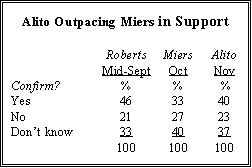
Judging from the public’s reception of President Bush’s two earlier choices to fill vacancies on the Supreme Court the successful nomination of John Roberts as Chief Justice and the withdrawn nomination of Harriet Miers his latest choice, federal appeals court Judge Samuel Alito, is off to a promising start.
A 40% plurality of the public agrees that, based upon what they’ve seen and heard so far, Alito should be confirmed. This compares with 33% who said the same of Miers in October. Alito’s support has not reached the 46% level Roberts enjoyed shortly before his confirmation hearings began in mid-September, but it is higher than the 35% support Roberts received earlier that month.
Three-quarters of Americans (75%) rate the president’s choice of the next Supreme Court justice as personally important, with 47% saying it is very important and 28% saying it is somewhat important. This is roughly the same level of concern expressed by the public last June, shortly before Justice Sandra Day O’Connor’s announced retirement gave President Bush his first opportunity to make an appointment to the high court.
Roughly two-thirds of conservative Republicans (66%) say the president’s choice of the next Supreme Court justice is very important personally; nearly as many liberal Democrats (62%) attach great importance to the selection.
Still, the nomination has attracted only modest public attention, with 21% saying they are following the news about Alito very closely and another 28% saying they are following it fairly closely. That is comparable to the level of public attention to Roberts and Miers.
Modest Concern Over Alito’s Ideological Impact
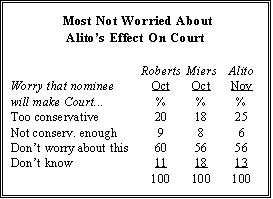
Although Alito, like retiring Justice Sandra Day O’Connor, is regarded as a likely tie-breaking vote on controversial issues, a majority of the public (56%) is unconcerned about the ideological direction in which he might move the court. Concern that Alito will move the court too far to the right is slightly higher, at 25%, than was the case of either of the two earlier nominees. By contrast, concern that Alito will not make the court sufficiently conservative is minimal (6%).
Conservative Republicans, in particular, say they are not concerned about Alito’s possible impact on the court’s ideological balance. Roughly seven-in-ten conservative Republicans (72%) say they do not worry about this, about the same percentage that expressed no concern over Roberts’s possible ideological impact.
Conversely, Democrats are considerably more worried about a move to the right by the Supreme Court should Alito take a place on its bench. Six-in-ten liberal Democrat, and about three-in-ten conservative and moderate Democrats worry that Alito would make the court too conservative. That is significantly higher than the number who expressed the same concern over Roberts (48% liberal Democrats, 23% conservative and moderate Democrats).

Democrats Not Rallying in Opposition
Opposition to Alito’s confirmation among Democrats is somewhat higher than in the case of Roberts. Nearly four-in-ten Democrats (39%) oppose Alito’s confirmation compared with a third of Democrats who opposed Roberts. But roughly a quarter of Democrats (27%) support Alito’s nomination and a third (34%) have no opinion.
Independents are even more uncertain about the nomination. A plurality (45%) express no opinion, while 34% favor Alito’s confirmation, and 21% are opposed. Republican support for Alito’s confirmation is comparable to that for Roberts in September.
Top Court Issues: Abortion, Rights of Terror Suspects

Among issues likely to come before the Supreme Court in the coming years, abortion continues to top the list of those of great importance to the public. More than six-in-ten (62%) say that court decisions relating to abortion are very important to them personally.
Close behind are issues relating to the rights of people held in custody as terrorist suspects (57%). Opinions on the importance of possible items on the court’s agenda are little changed since July.
Substantial minorities also accord high importance to court decisions regarding religious displays on government property (46%) and the size of money awards in personal injury lawsuits (44%). Fewer Americans say issues relating to affirmative action (38%) and homosexuality (36%) are very important to them personally.
Among religious groups, concern about the court’s abortion rulings is highest among white evangelicals and frequent churchgoers, 69% and 70% of whom, respectively, rate the issue as very important to them personally. However, seven-in-ten among the minority of the public that opposes Alito’s confirmation also assign high personal importance to the court’s abortion rulings.

The public continues to oppose the complete overturning of the landmark Roe v. Wade decision guaranteeing the right to an abortion. By more than two-to-one (65%-26%) the public opposes completely overturning the decision, which is consistent with results from recent years.
People who favor overturning Roe are more likely to personally consider abortion very important (78%, compared with 57% who oppose overturning Roe). They are also more likely than those who oppose overturning Roe to view the next Supreme Court appointment as very important (56% vs. 44%).
Overall, most Americans (60%) feel that Supreme Court nominees should be required to answer questions about issues like abortion during their confirmation hearings. Majorities of Roe supporters (62%) and opponents (56%) agree that court nominees should be required to answer senators’ questions about abortion and other topics that may come before the Supreme Court.

Iraq Outlook Remains Gloomy
Unlike the elections held in January, the recent constitutional referendum in Iraq garnered little public attention from the American public, and did little to change peoples’ outlook on the situation. Just 22% report having heard a lot about the recent referendum, and though the constitution was approved, Americans are no more optimistic today that it will make the situation in Iraq more stable than they were before the vote took place. Three-in-ten believe the successful referendum will make the situation in Iraq more stable, while most (56%) think things won’t change much and 6% expect it will make things worse.
This is in stark contrast to a wave of optimism following Iraq’s Jan. 30 elections, a news story that garnered far more public attention in the U.S. Nearly half of Americans (46%) reported having heard a lot about that election, and 47% thought it would make the situation in Iraq more stable.

Press Unfair to Bush?
As Bush’s approval ratings have declined, an increasing number of Americans particularly Republicans express negative opinions of press coverage of the administration. Just half of Americans say the press is being fair to the administration, the lowest number since Bush became president. Similarly, there has been a notable rise over the past two years in the percentage who say the press is too critical of the Bush administration.
Republican perceptions of press coverage of Bush have changed dramatically. Just a quarter of Republicans think news organizations are treating the Bush administration fairly, down from 50% who said the media treated the administration fairly in 2003 and 58% in 2001, shortly after he took office.
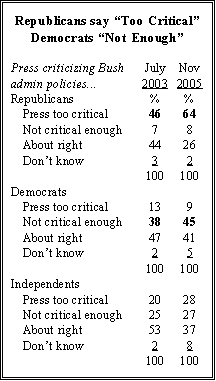
Republicans were far more positive about press coverage of the Clinton administration during the Lewinsky scandal of 1998; not surprisingly, most Democrats (54%) felt the press was unfair to the former president at that time. Nonetheless, comparing the reactions of partisans to press coverage of the two presidents, more Republicans see the press as unfair to Bush than did Democrats (by 63% to 54%).
A similar pattern is seen in public attitudes toward whether the press has been too critical or not critical enough of the Bush administration’s policies and performance. Currently, 34% think the press is handling coverage of the administration “about right,” while 32% say it is too critical of the administration, and 28% feel it is not critical enough. That represents a major change since July 2003, when nearly half (48%) believed the coverage of the Bush administration was about right.
Much of the shift has come among Republicans. Nearly two-thirds of Republicans (64%) see the press as too critical of Bush’s policies and performance, up from 46% in July 2003.
Democratic views have been more stable; a plurality of Democrats (45%) say coverage of the Bush administration has not been critical enough (up from 38% in 2003).
Stable Views of Press Watchdog Role
Overall opinions of the news media’s role as a watchdog on politicians has remained stable, despite growing sentiments among Republicans that the press is unfair to Bush. Fully 62% of the public believes that by criticizing political leaders, news organizations keep them from doing things that should not be done, while only 22% think such criticism keeps leaders from doing their job.
There are broad political differences in attitudes toward the press’s watchdog role. Roughly seven-in-ten Democrats (70%) and independents (72%) believe media criticism of political leaders keeps them from doing things they should not do, compared with 40% of Republicans.
Modest Attention to Bird Flu
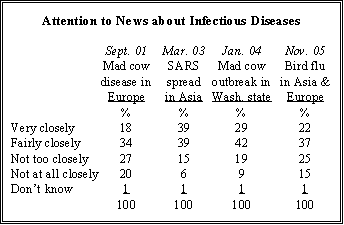
The public is paying limited attention to news about outbreaks of bird flu in Asia and Europe, and there is little to suggest that concerns about the spread of bird flu are particularly widespread. Just 22% say they are following news about the bird flu very closely. This is significantly lower than the 39% who followed news about the possible spread of SARS from Asia in 2003. Similarly, when cases of mad cow disease appeared in Washington state in early 2004, 29% reported following very closely.

While 29% of Americans say that too little attention is being paid to the possibility of a bird flu outbreak in America, 22% think we are paying too much attention to such a possibility. Most say they are either not too worried (38%) or not at all worried (23%) that a family member might be exposed to the bird flu. Women worry more than men about a family member contracting the virus (45% of women are very or somewhat worried, compared with 31% of men) and women are following the news story more closely.
While concerns are limited, so is confidence in the federal government’s ability to deal with a possible outbreak in the U.S. Just as many say they have little or no confidence in the government’s capabilities as say they have a great deal or fair amount of confidence. There is a sharp partisan divide in this sentiment. Three-quarters of Republicans (74%) have at least a fair amount of confidence in the government’s ability to deal with an outbreak, compared with barely a third (35%) of Democrats and 43% of independents.
News Stories and News Sources
Asked to cite the first news story that comes to mind when thinking about what’s been in the news lately, nearly half of Americans cited one of four major stories. News about Iraq and troop casualties was mentioned by 19%, followed by news about recent hurricanes and their aftermath (14%), the CIA-leak investigation (11%), and 5% first thought of news about Supreme Court appointments.
The poll found a correlation between the respondent’s source of news and “top of mind recall” of news stories. People who cite newspapers and network evening news programs as their main source of news were the most likely to think first about recent reporting about Iraq. People who rely most on network and local TV news were the most likely to think of news about the hurricanes and post-hurricane response. And while the CIA-leak investigation and Louis Libby indictment was only the third most cited story overall, it was the first to come to mind among people who get most of their news from the Internet.

Gas Prices Top News Interest
The high price of gasoline these days continues to top the public’s news interest, though attention has dropped slightly as prices have receded. Today, 61% say they are following media coverage of gas prices very closely, down from 67% in October. Interest is particularly high among lower income Americans. Fully 70% of people who’s household income is below $20,000 annually are following news about gas prices very closely, compared with just 47% of those earning $75,000 or more.

A related story oil companies reporting large profits over the past few months was closely followed by 37% of Americans, with another 33% following this story fairly closely. Democrats are far more attentive to this issue than are Republicans (42% very closely vs. 26%). In addition, people living in rural parts of the country followed this news far more closely (45%) than those in urban areas (29%).
Public attention to news about the situation in Iraq remains close, with 41% following very closely and another 40% fairly closely. This has remained fairly constant over the past year, with only a slight dip in attention during the crisis caused by Hurricane Katrina.
One-in-four closely followed news about the death of Rosa Parks. African Americans are twice as likely as whites to have followed this story very closely (44% vs. 21%). Related to this racial difference, 34% of Democrats overall followed news about Parks’s death very closely, compared with 16% of Republicans.



